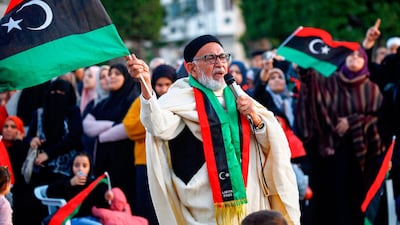The war in Libya has taken a dramatic turn with reports of Turkey deploying Syrian rebels to support its allies in Tripoli. Videos posted on social media showed Syrian fighters claiming to have already arrived in Libya.
This comes at a time when Turkey is preparing to deploy troops into Libya to support its ally the leader of Libya’s Government of National Accord, Fayez Al Sarraj.
Turkey's parliament will vote on the issue on January 8 or 9. If passed, Turkey could send naval forces and troops to the African nation, which has been in turmoil since the 2011 uprising that toppled and killed dictator Muammar Qaddafi.
A Turkish official and a senior GNA official said rebel groups that fought alongside Turkish forces in northern Syria are expected to deploy to support the Tripoli government imminently, Bloomberg reported on Thursday.
Reports emerged of the Mutasem grouping, from the Free Syrian Army, had already arrived in Libya and started fighting on the ground.
Rami Abdulrahman, head of the British-based Syrian Observatory for Human Rights, said as many as 500 Turkmen Syrian fighters have already been recruited in Turkey ahead of deployment to Libya.
“They are recruiting the fighters from different factions” of Syria’s opposition groups, Mr Abdul Rahman said.
The rumoured deployment of rebels comes just days after Mr Erdogan said the Turkish parliament would vote on a motion to send troops to Libya in a bid to bolster the government in Tripoli against Field Marshal Khalifa Haftar's Libyan National Army.
Aguila Saleh, leader of Libya's Parliament called Mr Erdogan’s move “unacceptable”, saying it would constitute unwanted meddling in the affairs of a friendly country.
The speaker also urged the international community to reject the legitimacy of the war-torn country's UN-recognised government, which is pursuing closer military ties with Turkey.
A joint statement from Mr Saleh and his Cypriot counterpart Demetris Syllouris also reiterated their condemnation of a maritime border agreement that Turkey signed with Libya’s Tripoli-based government — but which hasn’t been ratified, as necessary, by the Libyan parliament — as a “flagrant violation of international law that’s devoid of any legal basis.”
"In the coming days, the Libyan parliament will take action to ensure the withdrawal of international recognition of this government," parliament speaker Mr Saleh said in Cyprus.
Mr Saleh said he had asked Cypriot Foreign Minister Nicos Christodoulides to "convey a message to the European Union so that it withdraws its recognition of this government (the GNA).
"It is time to form a new government supported by the Libyan people and parliament."
According to the Cyprus News Agency, Mr Saleh said that Mr Sarraj isn’t authorised to sign any agreements on his own because according to an agreement on how the Libyan government should function, any agreement needs to have the unanimous approval of the nine-member presidential council and also requires parliamentary approval.
Speaking through an interpreter, Mr Saleh said Mr Erdogan took advantage of the divisions within Libya, as well as Tripoli’s control by “terrorist groups” to get the agreements approved in order to intervene in Libya’s internal affairs.
Mr Erdogan “sent in the past unmanned aerial vehicles and armoured vehicles, different types of weapons and has recently announced that he would send troops to fight in Libya,” Mr Saleh said.
Turkey has already sent military supplies to the GNA despite a United Nations arms embargo, a UN report released last month found.
Turkey has long backed the GNA in its fight against Field Marshal Haftar's Libyan National Army based in the east of the country.
Earlier this month, Field Marshal Haftar announced a “decisive battle" to wrest Tripoli from the GNA government.
A video claiming to show Syrian fighters in Libya had a fighter saying "The Free Syrian Army is in Libya to defend Islam"
Arnaud Delalande, a defence analyst specialising in Libyan affairs called the claims of pro-Turkey Syrian fighters immediately joining the conflict “pure gesture and rhetoric”.
Turkey is seeking to position itself as a major power player along the Mediterranean Sea, from Syria to Libya.
The proposed use of rebel groups to counter Field Marshal Haftar’s forces raises concerns of an escalation which would be difficult to rein in once unleashed.
Hassan Al Houni, a Libyan official who acts as a senior adviser to the prime minister, on Saturday denied that Syrian rebels will be deployed to Libya.
In Rome, asked about possible Turkish military action in Libya in support of Mr Sarraj's forces, Italian Premier Giuseppe Conte said he had tried to discourage any attempt at a military solution for Libya.
Mr Conte, who discussed Libya with Mr Erdogan in a phone call last week, told reporters on Saturday that a "proxy war" in the North African country across the Mediterranean from Italy would only aggravate the "incredible fragmentation" there.
"I implored Turkish President Erdogan" against military involvement, Mr Conte said.
Mr Conte called for stepped-up diplomatic pressure for a political solution, and said Italian Foreign Minister Luigi Di Maio might soon return to Libya to work for a "cessation of hostilities."

